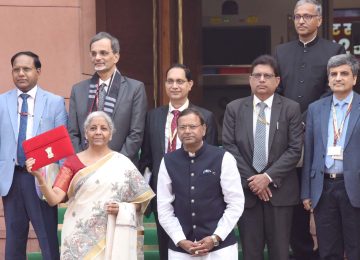Oil India, NABARD, and a Union Minister highlighted the importance of sustainability and ESG in three separate incidents.
Oil India
Oil India has joined the Oil and Gas Decarbonization Charter.
By signing up for the Oil and Gas Decarbonization Charter (OGDC), Oil India Limited (OIL), a Maharatna CPSE and a major player in the exploration and production of natural gas and crude oil, has demonstrated its commitment to sustainable energy practices.
“This significant step underscores OIL’s dedication to reducing carbon emissions and zero flaring initiatives and contributing to a greener future for the nation,” Oil India stated in a regulatory filing. Oil India said it is decarbonizing at a rate that will enable it to reach Net Zero by 2040.
NABARD
In the second instance, the National Bank for Agriculture and Rural Development (NABARD) products for rural institutions, with India experiencing an annual impact of $30 billion due to climate change.
Speaking at the FIBAC conference in Mumbai, KV Shaji, Chairman, NABARD, said, “…we are working with some international agencies to set up a carbon fund. This is because in the West a lot of developments are happening in the carbon credit market. We need to leverage those developments and our appetite for India.”
“We are working with the Food and Agriculture Organization (FAO) for setting up the carbon fund in India. We are also setting up some training institutes where we will have a climate change establishment,” he said.
Thirdly, Union Minister of State for Corporate Affairs and Road Transport and Highways, Harsh Malhotra emphasized India’s commitment to responsible business practices for sustainable development and ESG, emphasizing inclusiveness in achieving Viksit Bharat. He urged Indian businesses to adopt ethical and sustainable practices.
Justice Dipak Misra, former Chief Justice of India, highlighted the ethical importance of corporate governance and the role of Environmental and Social Responsibility (ESG) policies in ensuring businesses operate within justice and fairness. He emphasized that ESG is a philosophical thought and should not be treated as a legal compliance task. Misra urged nations to change the philosophy of commercial concerns and make corporate and individual awareness of the new lexicon of global thinkers.
Dr. Ajay Bhushan Prasad Pandey, Director General and CEO, IICA, emphasized the significance of responsible business conduct in India’s sustainable development agenda. The IICA’s School of Business Environment promotes responsible conduct through policy advocacy, research, and capacity-building programs.
Mr Malhotra and Justice (Retd.) Misra inaugurated the National Conference on Responsible Business Conduct 2024 recently.
The conference emphasized the importance of responsible business practices for sustainable development and the role of ESG, particularly inclusiveness, in achieving Viksit Bharat.
Key speakers included UNICEF Country Representative Cynthia McCaffery and ACCA CEO Helen Brand OBE. The conference also released a book and launched an online Data Portal on Business Responsibility and Sustainability Reporting.
Key discussions included ‘Responsible Governance: The Leadership Dialogue’, ‘Nature Restoration: Role of Business’, and ‘Sectoral Adaptation of the National Guidelines on Responsible Business Conduct in the Ready-Made Garment Sector’.










